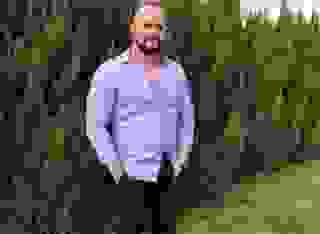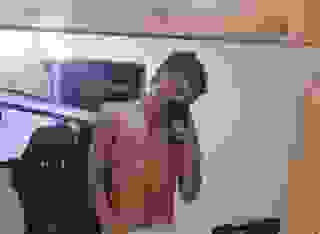Note: You can change font size, font face, and turn on dark mode by clicking the "A" icon tab in the Story Info Box.
You can temporarily switch back to a Classic Literotica® experience during our ongoing public Beta testing. Please consider leaving feedback on issues you experience or suggest improvements.
Click hereHe then contemplates smashing loose the hinges, which are on our side of the door, by somehow detaching one of the bed's legs to use as a club. This strikes me as another Strange Idea. Since I'm doubtful that the bedframe is made of material strong enough to break through a wooden door, I don't see how it could possibly be strong enough to break through metal hinges either. In any case, detaching a leg from the bedframe is a pipe dream. Allan uses his inability to dismantle the bedframe as an occasion to lobby me to reconsider yet again the "battering ram" plan: See how sturdy the bedframe is? I don't budge.
The office we're being kept in is apparently on the ground floor of a residential building. We can hear people moving around through the high ceiling and walking up and down a staircase on the other side of the short wall by the bed. Men loiter at times in the alley behind our room, apparently employees of the establishment across the way. Trucks come periodically to deliver supplies to them. Less distinctly, we hear people talking out in front of the building, women as well as men. On days it's not raining, we hear children playing in the streets; sometimes they'll run shouting down the alley past us.
Being held captive in the middle of the city, above ground, not under it, feels bizarre to me. Allan's more used to the idea, from his first weeks being held under an apartment building, where he could hear children playing through the bathroom vent. Surrounded by people—regular people, not hostages—I feel a little more like I'm living a normal life, less cut off from the world. That feels... good, sort of. It makes my situation more bearable in a way. But at the very same time, having the regular world so close isunbearable because it puts freedom tantalizingly just beyond reach. If only the grate were big enough to squeeze through. If only we could open that damn door.
I can see why Allan is susceptible to Strange Ideas about the possibility of escape. It seems like escape should be easy, the outside world isright there. My cowardice, my propensity for panic, is the only thing that holds me back from being swept away with him into wishful thinking and foolhardy risk-taking.
It's tempting to try to communicate with the outside—to speak to someone in the alley through the grate, or to shout for help to someone loitering in front of the office. But even Allan readily agrees we can't act on that temptation. We agree for different reasons. I'm afraid that if we try to communicate with the outside, we'll discover that the reason the guards feel secure leaving us is that they live right nearby, maybe over our heads, and they'll hear us calling for help.
Allan considers the attempt simply pointless. There's no question that we're back in the impoverished southern suburbs, which means there won't be any police to rescue us; but there will be members and supporters of the Partisans of God, the militia who may really be responsible for our kidnapping. The odds are that anyone we managed to make contact with would be unwilling to get involved, if they didn't outright sympathize with our captors. If we're going to escape, we're going to have to get ourselves out.
Nevertheless, I'll hear someone talking outside, and I'll think: Should we...? Then, when they leave: Did we miss our chance...?
Sometimes I have second thoughts about the "battering ram" plan. Maybe I am being overly timid and pessimistic, maybe it will work. I don't confess these doubts to Allan, though, because I know that if I do, he'll throw caution to the wind. And then I picture us trying, and failing, and being caught. And I hear Robert Berg screaming.
***
Within just a few days of the guards beginning to leave us alone, Allan sinks from his handsy excitement into a persistent low. He doesn't appear to be in danger of "sliding away" again, he's not that far gone, but he's discouraged and frustrated and testy. Our inability to escape is just one factor dragging him down. There are others.
The guards' neglect of us has two sides. The positive side is that we spend so much time alone, unmonitored. The negative side is that we are deprived of things we need.
When we're first transferred to the office, we find our tubs freshly stocked with everything we're used to, including tissues, matches, and cigarettes. But the guards won't replace anything. Shortly after our arrival, Allan and I both catch colds. They don't develop into anything more serious—miraculously, considering our conditions—but they linger for over a week, and before they're run their course we've used up all our tissues, which we've been also using as napkins, towelettes, and dust cloths. As is usually the case, the guards don't offer any verbal response when we ask them for more tissues. They also don't bring us more tissues. It's not a question of making us wait until an appointed time to replenish the ration. They never replace our tissues.
The same thing happens with cigarettes. Assuming that we'll receive new packs in a week, as we always have, Allan allows himself his usual ten to twelve cigarettes a day. But once he's used up the four packs that were waiting for us in our tubs, the guards won't give us new ones. The most Allan is able to beg out of them is a single cigarette handed to each of us at the end of each toilet run. It sounds like one of the guards doesn't even want to do that, but the other takes pity. The guards have to light our cigarettes for us before they leave because they won't replace our matches, either. As soon as the guards have left the room, I put out my cigarette so it doesn't burn down, but Allan can't save it for later, as he would like to do; he has to relight it with the still burning stub of his first cigarette and smoke it right away.
Nicotine deprivation makes Allan crabby. It's a side of his personality I haven't seen too often before, because until now he's kept it medicated. He's self-aware enough to be apologetic, but I still have to keep my distance, literally and metaphorically, to avoid being snapped at. I'll be pacing my square, for example, and suddenly Allan will lash out. "Will you give it a rest, for Christ's sake?" So I'll stop, and sometime later he'll apologize, and then I'll resume pacing. I'm grateful that he was still well-stocked with cigarettes during the days we were fighting over the "battering ram" plan. If he hadn't been, those fights would have been nastier, and he would probably have nursed his grudges longer.
Allan's crabbiness makes him more aggressive in dealing with the guards, which in turn makes me anxious that they'll react violently. He stops his routine thank-yous. And he becomes openly angry as he repeats his demands for our two most urgent needs—better food and more blankets.
The food situation: The guards give us nothing but cheese-and-flatbread sandwiches. One sandwich apiece in the morning, another in the evening. No tea, which we would love to have for the sake of warming ourselves. We have bowls, forks, and spoons in our tubs, which convinces us that we're supposed to be receiving rice and vegetables in the evening as usual. But these guards can't be bothered to prepare such a dish; sandwiches are easier. On a few occasions, the guards don't show up in the evening to feed us at all. Whenever that happens, I worry that this is it, we're fucked—the guards have decided for good to make a single sandwich per day the new routine. Fortunately, the one-feeding-a-day occasions prove to be flukes.
The guards don't come into our room to deliver our food. Instead, they hiss to get our attention and hold the sandwiches out to us through the gap under the door; one of us has to walk over and crouch to fetch them. Evidently the guards find it burdensome to have to turn the key to open the door again once they've locked us in after the toilet run. Nor do they have the forethought to prepare our sandwiches while we're in the bathroom. If they did, they could hand the sandwiches to us as we return from the toilet run or as they light our cigarettes.
Sometimes the guard doesn't wait to pass the sandwiches to us, he just tosses them through the gap under the door onto the floor. We become convinced, eventually, that one of the guards is in the habit of doing this, while the other normally waits to hand the sandwiches to us. Allan privately dubs the sandwich-tosser Rat Bastard, and the sandwich-passer Less a Bastard. We suspect that Less a Bastard is the one who was willing to give us cigarettes over Rat Bastard's objections.
Allan protests the tossing of the sandwiches, but it doesn't do any good. Anyway, our higher priority is getting something to eat other than sandwiches. Allan begs bilingually. We need rice,riz. Vegetables,végétales. Please, do you understand?Comprenez-vous?
His pleas thump uselessly against the wall of silence. The fact that we can't hear or see a response from the guards makes the situation more frustrating. We have no idea what's happening here. Do the guards not understand what we're asking for? Or do they understand and not give a shit?
One night, while Allan and I are both suffering from our colds, the guards show up, take us for toilet runs, light our cigarettes, toss our sandwiches under the door, and leave. It's nothing we haven't experienced on other nights, but this time Allan's had enough. When the guards return the next morning, he lets them have it. He's sufficiently self-controlled not to raise his voice to the level of shouting, and he retains a plaintive note; even so, there's no mistaking his fury. I can't see what he's doing at the time, of course, because I'm wearing my blindfold, but I learn later that he's brandishing his bowl at the guards as he harangues them. We are sick, we have been sick for days, can't the guards see that? And we will stay sick, we will get even sicker, if we don't get more food and better food. Two pieces of bread and cheese a day are not enough. We need rice, we need vegetables—we need fruit, for God's sake, oranges, we're sick, how many times do we have to beg you?
I'm scared that at any moment the guards will start hitting Allan. One of them finally hisses, very loudly and harshly, to tell Allan to shut up, adding an angry, imperious sentence in Arabic. Following our toilet runs, though, a guard hands us our sandwiches under the door rather than throwing them. I would like to read that as a good sign—a sign that they're feeling a little chastened; a sign, maybe, of further improvements to come. Then again, the sandwich-tossing and the sandwich-handing alternate frequently enough that it probably doesn't mean anything.
That evening, the guards surprise us. For dinner, they bring each of us a packet of wrapped foil, inside of which is a veritable mound of rice and lentils—accompanied by a piece of roasted chicken! It's been almost nine months since I've seen meat. The food is still warm, they must have brought it from somewhere not too far away, an eatery, or a street vendor, or someone's home. I eat ravenously. The rice and lentils are tastily spiced, with garlic and I don't know what else. The food sits warm and heavy in my stomach. For once, I feel full when I'm done.
One of the guards says something that I interpret as being along the lines of: There, are you happy now? Allan sounds grudging when he thanks them, so I enthuse to compensate. Thank you very much, this is very good, thank you... Allan reprimands me later. Don't be servile, the guards weren't doing us a favor, they ought to have been feeding us like that every night.
I'm hopeful. Does this mark the beginning of a permanent improvement in our diet? Yes and no. The next day, the guards revert to giving us nothing but cheese sandwiches; never again do they feed us anything different. (Is that because, when they did, Allan didn't thank them effusively enough?) The one improvement is that the guards now hand us two sandwiches apiece in the morning instead of one. Nutrition remains a serious problem, but at least our calorie intake is higher.
Our other urgent need is blankets. Allan warns me that winters in Beirut are rainy and very cold. The temperature doesn't actually fall to freezing, but we'll feel freezing because of the humidity. If I think it's bad now, in late November, the next three months are going to get worse. The open grate to the outside is a big problem in this regard: it will be like having a window open all winter. A sweater and an extra pair of socks aren't going to be enough. If the guards aren't planning to give us warmer clothes—pants, coat, gloves and a scarf would be in order—they at least have to give us more blankets.
With the food situation, Allan is able to wring some concessions from the guards; with the blankets situation, he gets nowhere. Every time the guards come, Allan insists that we are very cold,très froids. We must have more blankets.Plus de couvertures, s'il vous plait! Being so cold is keeping us sick,malades. The situation becomes all the more infuriating once we've peeked through the grate into the guards' room and have seen the blankets they're no longer using now that they don't spend the nights here. Allan presses them, gesturing toward the other room: Do you have more blankets?Y a-t-il plus des couvertures? It drives us crazy that we can't directly ask for the blankets we know are out there without revealing that we've been peeking.
I have the notion that if I resist the temptation to spend the day wrapped in my blanket, I'll be warmer by contrast when I cocoon myself under the blanket at night, thus making the single blanket feel more adequate. All the pacing I do is partly an alternative means to warm myself up during the day. I can't be so active while I'm sick, though, and I do end up spending long stretches of those days curled under my blanket. For a time I have a fever, which makes me feel that much colder.
During the week-plus that I have my cold, I wallow in self-pity. I want more tissues—or even better, a handkerchief. I want aspirin. I want cough drops. I want orange juice. I want chicken noodle soup. I want more fucking blankets. As long as I'm wishing for things I'm not going to get, I want to fucking go home. I fantasize about a concerned neighbor hearing us coughing through the grate, investigating, and proving brave enough to get us out of here.
My sole consolation while I'm sick is that here I can refill my water bottle twice a day instead of once, so I can get more fluids into me. The guards make us refill our own bottles in the bathroom, where the tap water is apparently (please, God) safe to drink.
I pray desperately that neither Allan nor I will get any sicker. As our colds drag on, the discomfort becomes exasperating, but our health doesn't deteriorate further, thankfully—this despite our lack of nourishment and rest. Neither of us sleeps well, due to the frigid nights and our unrelieved symptoms. I'm sure that sleep deprivation is compounding Allan's nicotine-related crabbiness. My own lack of sleep makes me less willing to put up with Allan's snapping without snapping back myself.
***
Beginning on the night of November 30, we adopt a new strategy for dealing with the blankets shortage.
That day is Allan's thirty-first birthday. He informs the guards the day before, using his customary combination of English, French, and sign language to let them know that tomorrow will be his "happy birthday." He sings the birthday song to himself by way of illustration. As usual, the guards don't say anything that would indicate they understand, but Allan is hopeful the message got through. He wants them to take a photo for his family, as the guards at the Shouf prison did for me on my birthday. That photo will be, as far as he knows, the first proof his family has received that he is alive. Paul and Donald seemed to regard my birthday party as a customary event, so Allan is optimistic that there's one in store for him, too. Despite how lazy our guards are, they'll have to arrange a birthday photo if the chefs expect them to.
Allan is anxious, and therefore irritable, all day on the 30th. Nothing unusual happens during the guards' morning visit, so his hopes are now pegged entirely on the evening.
Evening comes. The guards take us to the bathroom, give us our cigarettes and our sandwiches, like normal. Oh please, don't just leave... The light in the front room goes off. The door to the street closes. They're gone.
The light entering from the alley through the grate allows me to see Allan sitting on the edge of the bed, smoking. It's his night to sleep in the bed, but if it hadn't been, I would have let him have the bed as a birthday present. I'd like to go sit next to him, but I worry he'll growl at me, so I stay on the mattress. I ask him how he's feeling. "How do you think?" he says sullenly.
When his cigarette is close to burning out, he apologizes for snapping and asks for his second cigarette, meaning the one that the guards gave me. I bring it to him. Would he mind if I sit with him? Sure, go ahead.
This is one of those moments when I wish I knew how to touch him in a convincingly "straight male buddy" sort of way, the way he touches me. A firm clap on the shoulder, an athletic grip of his knee or double-pat on the thigh. Instead, I simply tell him how terrible I feel. "Fuckers," Allan says in quiet rage. He smokes the second cigarette in silence, leaning forward onto his knees. I sit beside him with my hands clasped between my own knees, for warmth, trying without success to work up the courage to lay my hand on his back.
Allan says, "It's been a shitty day, and now it's going to be another shitty night. Let's try to get some sleep."
I lie awake under my blanket, listening to Allan toss and turn on the creaky bed, more than usual, I think. We both still have our colds, although they seem to be moving into their final stages. Outside it's raining, a sad, frigid sound that makes the atmosphere more miserable.
Out of the blue, Allan says, "I can't take this anymore. Listen. What do you say you come get in the bed, so we can put both blankets on top of us?"
For me, this proposal is dangerous. But of course I can't tell him why I ought to refuse. Plus... I've had it up to here with the cold, too.
Allan slides over against the wall to make room for me on the narrow bed. He isn't facing the wall, though, as I would have expected. I lie on my side, on the very edge of the bed, facing away from him. "No, turn the other way," Allan instructs me. This means we'll be facing each other. I guess he wants to use our breath to help warm us up. I comply, nervous. We shift around for a while, tucking the edges of the two blankets under our shoulders, sides, hips, legs, and feet, sealing ourselves off from the cold air. Our knees are bent, touching, so that we'll be short enough to pull the blankets up over our heads, although we leave the upper edge untucked so air can circulate. We fold our arms across our chests. I duck my head so that I won't breathe into Allan's face.
It doesn't take long to feel the difference made by the double layer of blanket and our shared body heat. "This is definitely better," Allan says.
It's definitelywarmer, which is why we go on sleeping this way every night after that. But our sleep is fitful, and crabby Allan is prone to snarl about it. Any time one of us moves or coughs, it's likely to wake the other. I hold back as long as I can before getting up to pee, but I know Allan's irritated by how often I still have to do it.
Because of how frequently we wake each other up, I don't think we gain any sleep by huddling together in the bed. Nevertheless, we keep doing it because we value what we gain in warmth. To compensate for the lack of sleep at night, we nap a lot during the day. We usually take our naps huddling, too.








